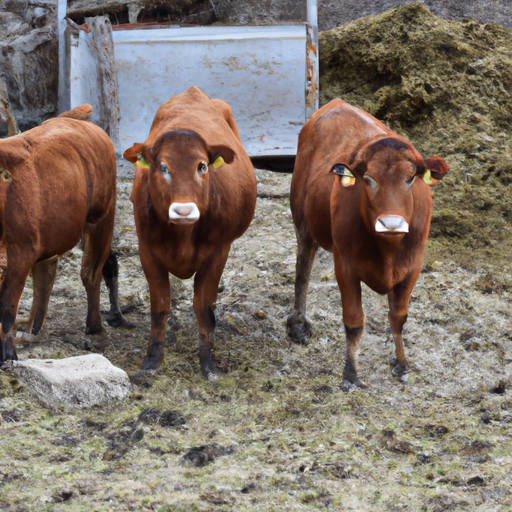Are you thinking about starting a small farm or living off the grid? Have you ever wondered what essential supplies you need to take care of livestock? Well, you’re in the right place! In this article, we will discuss the key items you’ll need to ensure the well-being and proper care of your animals.
First and foremost, when it comes to livestock care, you can’t overlook the importance of shelter. Animals need a safe and secure place to rest and seek refuge from harsh weather conditions. Depending on the size and type of animals you plan to raise, you may need to invest in barns, stables, or sheds. These structures should provide ample space for your livestock to move around comfortably.
Next on the list is fencing. Fencing is crucial to keeping your animals contained and safe from predators. Your fencing requirements will vary based on the type of livestock you have. For larger animals like horses or cows, sturdy wooden or metal fencing might be needed. Smaller animals like chickens or rabbits may require wire mesh or electric fencing. It’s important to research the specific needs of your animals to ensure you choose the right type of fencing.
Lastly, don’t forget about water and feed. Livestock require a constant supply of fresh water to stay hydrated. You’ll need to invest in water troughs or buckets that are suitable for the size and number of animals you have. Additionally, proper nutrition is crucial for the health of your livestock. You’ll need to provide a balanced diet that meets their dietary requirements. Depending on the type of animals, this could involve purchasing hay, grains, or specialized animal feed.
In conclusion, starting a small farm or living off the grid with livestock can be a rewarding and fulfilling experience. However, it’s important to have the necessary supplies to properly care for your animals. From shelter and fencing to water and feed, these essential supplies are vital to ensuring the well-being of your livestock. If you want to learn more about this topic, keep reading the article for further information and valuable insights.

Introduction to Livestock Care
Livestock care is an essential aspect of farming and raising animals. Whether you are a seasoned farmer or just starting out, understanding how to properly care for your livestock is crucial for their health and well-being. This article will guide you through the various aspects of livestock care and highlight the essential supplies you need to ensure the best conditions for your animals.
Understanding Livestock Care
Livestock care involves providing suitable housing, proper nutrition, healthcare, breeding, and grooming for your animals. Each of these aspects plays a significant role in the overall health and productivity of your livestock. By understanding the specific needs of different types of animals, you can ensure their comfort and welfare.
Benefits of Raising Livestock
Raising livestock not only provides a source of food and income but also offers a range of other benefits. Livestock can help manage the land, provide natural fertilizer, and contribute to a sustainable farming system. Furthermore, interacting with animals can be a rewarding and therapeutic experience, fostering a deeper connection with nature.
Housing and Fencing
Building Suitable Shelters: Proper housing is vital for protecting your livestock from harsh weather conditions and predators. Depending on the type of livestock you raise, you may need to construct barns, sheds, or simple shelters. Ensure that the housing is well-ventilated, well-insulated, and provides enough space for your animals to move comfortably.
Choosing the Right Fencing: Fencing is essential for keeping your livestock safe and contained within designated areas. The type of fencing you choose will depend on the size and strength of your animals. Electric fencing, woven wire, and wooden fences are commonly used options. Regular inspections and maintenance of fencing are necessary to prevent any escape or injury.

Feeding and Watering
Proper Nutrition for Livestock: Providing adequate nutrition is crucial for the overall health and productivity of your livestock. Consult with a veterinarian or livestock nutritionist to determine the appropriate diet for your animals. This may include a combination of pasture grazing, hay, grains, and specialized feed. Regularly monitor the body condition of your livestock to ensure they are receiving the right amount of nutrients.
Watering Systems for Livestock: Access to clean and fresh water is essential for the well-being of your animals. Install water troughs or automatic waterers in each designated area to ensure a constant supply of water. Regularly clean and maintain these water sources to prevent the spread of diseases.
Healthcare and Veterinary Services
Importance of Regular Check-ups: Regular check-ups by a qualified veterinarian are essential to monitor the health of your livestock and detect any underlying issues. Vaccinations, deworming, and routine examinations should be a part of your livestock care routine. Pay close attention to any changes in behavior, appetite, or physical appearance of your animals, as these may be signs of illness.
Common Livestock Diseases and Prevention: Livestock can be susceptible to various diseases, such as foot rot, mastitis, and respiratory infections. Understanding the common diseases that affect your specific type of livestock is crucial for prevention and early intervention. Vaccination programs, biosecurity measures, and proper hygiene practices can significantly reduce the risk of disease outbreaks.
Handling and Safety Equipment
Necessary Tools for Handling Livestock: Proper handling of livestock is essential for their safety and your own. Depending on the size and temperament of your animals, you may need tools such as halters, lead ropes, sorting sticks, and livestock prods. Make sure these tools are in good condition and easily accessible whenever you need to move or handle your animals.
Protective Gear for Your Safety: It is important to prioritize your safety when working with livestock. Wear protective gear, such as gloves, boots, and coveralls, to prevent injuries and minimize the risks associated with handling animals. Additionally, consider investing in safety equipment such as headlamps, first aid kits, and fire extinguishers to ensure a safe working environment.
Breeding and Reproduction
Understanding Animal Breeding: Breeding livestock requires careful consideration of genetics, traits, and desired outcomes. Familiarize yourself with the breeding cycles and behaviors of your specific type of livestock. Decide whether natural breeding or artificial insemination is the best option for your animals. Seek guidance from experienced breeders or veterinarians to ensure successful breeding and healthy offspring.
Managing Reproduction Cycles: Proper management of reproduction cycles is crucial for maintaining a healthy and productive herd or flock. Keep accurate records of breeding dates, pregnancy testing, and birthing information. Ensure adequate separation of males and females during specific periods to control mating and prevent unwanted pregnancies.
Supplements and Medications
Essential Supplements for Livestock: Supplementing your livestock’s diet with vitamins, minerals, and other essential nutrients can help maintain their overall health and optimize productivity. Consult with a veterinarian or livestock nutritionist to determine the specific needs of your animals and identify any deficiencies that may require supplementation.
Medications and First Aid Kits: Stocking a first aid kit with essential medications and supplies is essential for addressing minor injuries and illnesses in your livestock. It is important to have items such as wound cleansers, antiseptics, bandages, and antibiotics readily available. Consult with a veterinarian to determine the appropriate medications for your livestock and ensure proper storage and administration.
Tools for Grooming and Maintenance
Grooming Supplies for Livestock: Grooming your animals helps maintain their cleanliness, manage their coats/hair, and prevent skin diseases. Depending on the type of livestock, grooming supplies may include brushes, combs, hoof picks, and shearing equipment. Regular grooming sessions also provide an opportunity to closely inspect each animal for any signs of illness or parasites.
Maintenance Tools for Farm Equipment: Proper maintenance of farm equipment is crucial for smooth operations and efficient livestock care. Invest in tools such as wrenches, lubricants, and cleaning supplies to regularly inspect and service equipment, such as tractors, feeding systems, and water systems. Regular maintenance helps prolong the lifespan of your equipment and prevents breakdowns during critical times.
Transportation and Livestock Handling
Safe Transportation of Livestock: If you need to transport your livestock for shows, sales, or veterinary visits, ensure proper transportation methods are employed. Use trailers or trucks specifically designed for livestock transport to ensure their safety and welfare during travel. Follow guidelines for loading and securing animals to prevent injuries and stress.
Loading and Unloading Techniques: Proper loading and unloading techniques are crucial to minimize stress and injuries to your livestock. Familiarize your animals with the trailer or transport vehicle beforehand to reduce anxiety during the process. Use safe and efficient methods of loading, such as ramps or chutes, and avoid overcrowding.
Conclusion
Caring for livestock requires a holistic approach that addresses their housing, feeding, healthcare, breeding, grooming, and transportation needs. By understanding the specific requirements of your animals and investing in the essential supplies outlined in this article, you can ensure their well-being and productivity. Remember to always consult with experts and veterinarians to tailor your livestock care practices to the unique needs of your animals. With proper care and attention, your livestock can thrive, contributing to a successful and fulfilling farming experience.




